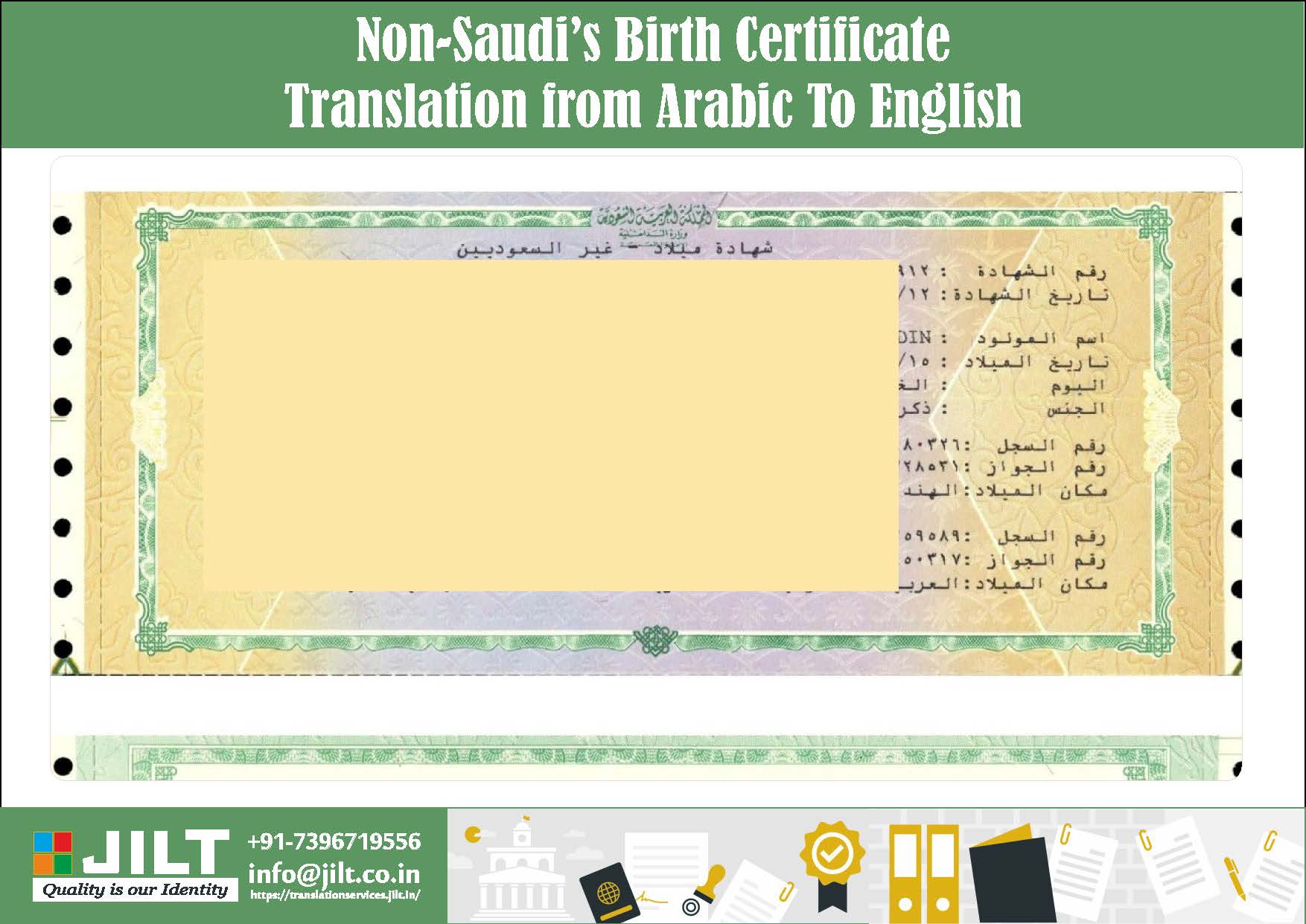
THE ESSENTIAL GUIDE TO TRANSLATING NON-SAUDI BIRTH CERTIFICATES FROM ARABIC TO ENGLISH
by Dr. Abu Mazhar Khalid Siddique - October 19, 2023
Translating a birth certificate from Arabic to English is a crucial step for individuals from non-Saudi backgrounds who require documentation for various purposes. Whether it's for immigration, education, or other legal matters, a properly translated birth certificate is a necessity. In this comprehensive guide, we'll walk you through the process, including the importance of accurate translations, the steps involved, and the challenges you may encounter.
The Significance of Accurate Translation
A birth certificate is a fundamental document that proves an individual's identity and date of birth. When you're dealing with a birth certificate from a non-Saudi country, accurately translating it into English is essential for several reasons:
Legal Compliance: For any official or legal matter, such as visa applications, marriage licenses, or academic enrollment, a translated birth certificate is often required. Legal authorities and institutions need to ensure that the document is accurate and reliable.
Immigration: If you're moving to a new country or applying for a visa, immigration authorities will require a translated birth certificate to verify your identity and age.
Education: Many educational institutions, especially when applying for admission or transferring academic records, will ask for a translated birth certificate.
Personal Records: Having a translated birth certificate makes it easier for non-Saudi residents to maintain their personal records and access services in their new country of residence.
Steps for Translating a Non-Saudi Birth Certificate
Translating a birth certificate from Arabic to English is a multistep process that involves accuracy, attention to detail, and, in numerous instances, professional assistance. Here's a step-by-step guide to help you through the process:
Gather the Original Document: The first step is to obtain a copy of the original birth certificate. Ensure that it's a certified copy from the relevant government authority in your home country.
Find a Certified Translator: Not all translations are considered equal. To ensure the document's validity, you should enlist the services of a certified translator who specializes in Arabic to English translations. Look for a translator with expertise in legal translations, as this will be crucial for official documents like birth certificates.
Verify the Translator's Credentials: Before proceeding, ensure that your chosen translator is accredited and recognized by relevant authorities. Check for certifications or memberships in professional translation associations.
Submit the Document to the Translator: Provide the translator with the original birth certificate, along with any specific instructions or requirements you may have. Be prepared to answer questions or provide additional information if needed.
Review the Translated Document: Once the translator has completed the translation, carefully review the English version for accuracy. It should include all the pertinent information from the original, with no omissions or errors.
Notarization and Certification: Depending on the intended use of the translated birth certificate, you may need to have it notarized or certified. This involves having a notary public or an authorized certification entity confirm the accuracy of the translation and the identity of the translator.
Submission to Relevant Authorities: If you are using the translated birth certificate for official purposes, submit it to the respective authority or institution. Make sure you follow their specific guidelines and requirements.
Challenges and Considerations
Translating a birth certificate from Arabic to English can be challenging due to various factors, including:
Language Nuances: Arabic and English are linguistically distinct. A professional translator must navigate these linguistic nuances while ensuring the translation remains faithful to the original document.
Legal Terminology: Birth certificates often contain legal jargon and specific terminologies that require precise translation. Errors in legal terminology can lead to complications in official proceedings.
Cultural Sensitivity: Translators must be culturally sensitive when translating names, titles, or other personal information, as cultural differences can lead to misunderstandings.
Regional Variations: Different Arabic-speaking countries may have variations in language and format on their birth certificates. Translators must be familiar with these differences and adapt their translations accordingly.
Translating a non-Saudi birth certificate from Arabic to English is a critical process, and it's essential to get it right. Accurate and reliable translations are not only required by authorities, but also necessary to maintain your personal records and navigate various aspects of life in a new country. By following the steps outlined in this guide and seeking the assistance of professional, certified translators, you can ensure that your translated birth certificate is both legally valid and culturally appropriate.
Our organization employs native-speaking translators who can provide certified translation services in any language. We provide translation services in English (Urdu), Arabic (Spanish), German (French), Persian (Iranian), French (Italian), Japanese (Korean), Russian, and any other Indian or local language. Expert proofreaders at our company will inspect the translation. We also provide a courier service to deliver completed documents to our clients.
- Also Read :- IQAMA: THE RESIDENT IDENTIFICATION IN SAUDI ARABIA (KSA)
- Also Read :- Documents Required and need to be Translated from German into English
- Also Read :- The Importance of Terminology Management in Translation
- Also Read :- LISTED BELOW ARE TEN OF THE MANY APPLICATIONS OF MACHINE LEARNING IN THE FINANCIAL SECTOR.
- Also Read :- Blockchain and the Translation Industry: A Positive Perspective
- Also Read :- Police check translations (JILT - Certified Translation Services)
- Also Read :- WHY YOU ARE REQUIRED TO TRANSLATE A BIRTH CERTIFICATE?
- Also Read :- Services for banking and financial translation
- Also Read :- Documents need to be translated from English into Arabic for admission in Jamia Islamia Madinah Munawwarah – KSA
- Also Read :- Driving License Translation Services
Search
Categories
Archives by Month
Popular Blog
QUICK TRANSLATION QUOTE
Need help with a translation?
Get in touch with us
Whether you have a specific project you want to discuss, need a translation quote or simply want to discuss your requirements, do not hesitate to get in touch with us.











Social Networks